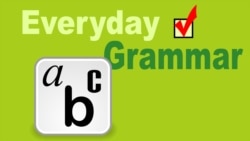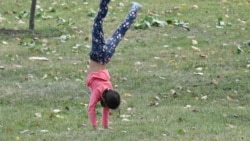We have an expression in English that goes “Use it or lose it.” It means that if you do not use or practice an ability, you might lose that ability.
That could not be more true about English grammar.
And here at Everyday Grammar, we do not always give you a chance to review the material we teach you. So today I am going to do that with a short quiz on some of the grammar rules I have talked about on the show.
Ready to test yourself? Then let’s get started. I will ask you questions. You will have only a short time to choose your answers.
Question 1. Imagine someone is giving you directions to a supermarket. The person wants to express that finding the place is not difficult at all. Which of these could they say?
a-The supermarket is easy finding.
b-The supermarket is easy to find.
c-Both are correct.
The answer is b. The supermarket is easy to find. After some adjectives, such as “easy,” we use an infinitive verb — not a gerund. In the correct sentence, the infinitive is “to find.”
Question 2. Since the stay-at-home orders began, many of us have been spending a lot of time at home. Suppose things were starting to become boring. How might you express it?
a-I am bored of staying at home every day.
b-I am bored to stay at home every day.
c-Both are correct.
The answer is a: I am bored of staying at home every day. Some adjectives, such as “bored,” are followed by a preposition. And after a preposition, you will find a gerund or some other noun — not an infinitive verb. In the correct sentence, the gerund is “staying.”
Question 3. Suppose you were making dinner and got an important phone call. So, you set aside what you were doing and took the call. Which of these could you say?
a-I stopped to take an important call.
b-I stopped taking an important call.
c-Both are correct.
The answer is a: I stopped to take an important call. In the correct sentence, “stop” is followed by the infinitive “to take.” When we follow “stop” with an infinitive verb, it means someone suspends one action for the purpose of doing something else.
Question 4. This one is about cleft sentences. If you do not remember much about them, try reviewing them before answering the question. Which of these is an example of a cleft sentence?
a-It was the film Avengers: Endgame that led theater box offices last year.
b-It was the superheroes who held the Infinity Stones before Thanos.
c-Both are cleft sentences.
The answer is c. Both are cleft sentences.
In cleft sentences, the first clause gives information that is new to the listener, such as “It was the film Avengers: Endgame…” The relative clause gives information known to the listener, such as “…that led box offices last year.”
Question 5. Imagine that you wanted to tell people about a fun or unusual skill or ability from your childhood days. Which of these is a correct way to say it?
a-I could walk on my hands when I was 10.
b-I was able to walk on my hands when I was 10.
c-Both are correct.
The answer is c. Both are correct. English speakers almost always use the word “could” to talk about general skills or talents from the past. “Was able to” is also possible but used less often in spoken English.
Question 6. Suppose some tree branches kept hitting the top of your house and making noise. So, you went up there and cut down the branches. What could you say after the work was done?
a-I was able to cut down the branches.
b-I could cut down the branches.
c-Both are correct.
The answer is a. I was able to cut down the branches. When talking about a past ability during a specific occasion, we use “was (or) were able to” — not “could.”
Question 7. As a reminder, a collocation is a group of two or more words that is commonly used together. Which of the following is an example of a verb + noun collocation?
a-a stupid mistake
b-make a mistake
c-sadly mistaken
The answer is b. make a mistake. All three answers are examples of collocations, but only “make a mistake” is an example of a verb + noun collocation. The verb is “make” and the noun is “mistake.”
Now for our final question:
Question 8. This one also deals with collocations. Which of these is an adverb + adjective collocation?
a-happily married
b-happily alive
c-thankfully happy
The answer is a. happily married. The other two answers are not examples of ways we commonly put words together.
So, how did you do on the quiz? Good, I hope.
If you would like to review any of the grammar from the program today, visit our website, learningenglish.voanews.com.
Join us again soon for another chance to test yourself.
I’m Alice Bryant.
Alice Bryant wrote this story for VOA Learning English. George Grow was the editor.
________________________________________________________________
Review and Practice
You can review the following programs to learn more about the grammar from today's quiz. And be sure to practice the grammar at home in your speaking and writing!
A Common Form: Be + Adjective + Infinitive (for Question 1)
What Are You Excited About Learning? (for Question 2)
Verbs that change with Gerunds and Infinitives (for Question 3)
Cleft Sentences in Speaking, Writing (for Question 4)
Past Ability: Could, Was Able To, Managed To (for Questions 5 and 6)
Do These Things to Improve Your Collocations (for Questions 7 and 8)
________________________________________________________________
Words in This Story
practice - v. to do something again and again in order to get better at it
review - v. to study or look at something again
quiz - n. a short spoken or written test that is often taken without preparation
infinitive - n. the basic form of a verb (to + verb)
gerund - n. an English noun formed from a verb by adding -ing
boring - adj. dull and uninteresting
box office - n. an area in a theater where tickets are sold for a movie or performance
clause - n. a part of a subject that has its own subject and verb
branch - n. a part of a tree that grows out from the trunk
occasion - n. a particular time when something happens






